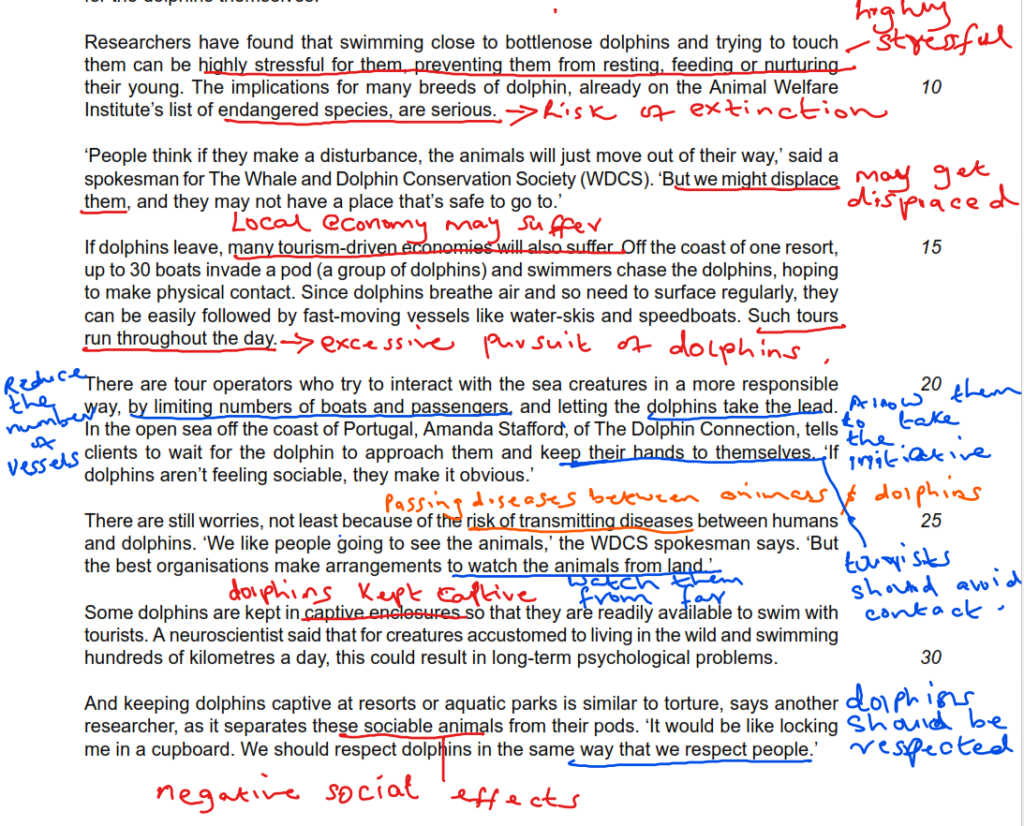A summary is a reduced version of a text, focusing on a specific idea(s). In the Cambridge exam, you are required to write a summary of 120 words, based on a specific question. Your work will be marked out of 15 marks. Your reading ability will score 10 marks while quality of writing will be assessed out of 5.
What exactly is assessed in reading?
- A wide range of relevant ideas
- Ideas well focused and consistent
- An effective response that shows a thorough understanding of the summary task.
What exactly is assessed in writing?
- A relevant response that is concise, clearly and fluently expressed
- Use of own words where appropriate
- Well-chosen vocabulary which clarifies meaning
- Accurate spelling, punctuation and grammar.

- Begin by reading the summary question. This will make it easier for you to highlight relevant ideas as you read the passage. It will also save you on time.
- If the question has two strands, ensure that you highlight ideas for both parts.
Eg. According to Text B, what are the arguments against swimming with dolphins and what are responsible tour operators doing to improve the situation?
- As you highlight ideas in the text, annotate on the side, in your own words, the exact point that is being made.
- You need 9-10 relevant points for a well written summary.
- You must use your own words– your own understanding. Just be very careful not to change the meaning of the original ideas.
- Group similar ideas and write them close together in your summary. This will greatly help in the coherence of your summary.
- Use connectives to link ideas together.
- To build ideas use, Firstly, secondly, Moreover, in addition, furthermore, also etc.
- To contrast use however, in contrast, unfortunately, on the other hand.
- Write your summary in a single paragraph. For summaries with two strands, you can divide your work into two paragraphs.
- Stick to the word limit. Writing beyond 120 words is not recommended.
- As you write your summary, begin with a topic sentence that answers at least one of the relevant points.
- Avoid simple sentences. Maximize on using compound and complex sentences.
- DON’T explain each point. Some ideas will need to be combined together for them to explain each other. ONLY elaborate points that need elaboration.
- DON’T use first person pronouns. You should be impersonal.
- DON’T write include examples and descriptions.
- DON’T mix tenses. Stick to one, based on what the question requires.
- DON’T use figurative language like imagery, rule of three, repetition etc. Stick to factual language and clearly organised sentences.

Question. According to Text B, what are the arguments against swimming with dolphins and what are responsible tour operators doing to improve the situation?
| Paragraph 1 | |
| Topic sentence that rewords the first part of question and makes the first point. | One argument against swimming with dolphins is… |
| (combine point 2 and 3) | |
| (combine point 4 and 5) | |
| Point 6 | |
| Paragraph 2 | |
| Topic sentence for the second part of the question and make the first point | There have been several actions by responsible tour operators such as…. |
| (combine point 8 and 9) | |
| Point 10 |
Read Text B and then answer the summary question given.

Question: According to Text B, what are the arguments against swimming with dolphins and what are responsible tour operators doing to improve the situation?
Possible points for the question
Arguments against swimming with dolphins
- Highly stressful and traumatic to dolphins.
- Dolphins are endangered and at risk of getting extinct.
- Dolphins can easily get displaced with no safe place to go.
- The displacement will cause suffering of the local economy.
- There is excessive pursuit of dolphins by tour companies.
- Dolphins are being kept in captivity.
- This negatively affects their social life.
- Risk of disease spread between humans and dolphins.
Actions by tour operators to improve the situation
- Advice on reducing the number of water vessels and passengers.
- Allow dolphins to take initiative on whether they want to be social.
- Tourists to watch dolphins from far/land.
- Tourists should avoid contact with dolphins.
- Dolphins should be respected.
Grouping ideas
Part 1
Topic sentence + point 1
Group 3 and 4
Group 6 and 7
Part 2
Topic sentence + point 13
Group 9, 11, 12, 10

Sample summary
One argument against swimming with dolphins is the trauma and stress it causes the innocent animals. Due to this, dolphins can easily leave their territories to unsafe places resulting to great suffering of the local tourism economy. Furthermore, dolphins being kept in captivity and away from their wild habitat can hugely affect their social life.
There have been several actions by responsible tour operators who demand that dolphins’ wishes should be respected just like those of human beings. Similarly, they advise on minimal human contact with dolphins through reduction of the number of water vessels and passengers. Instead, tourists should watch dolphins from the land as this will ultimately allow the animals to decide when they want to be sociable. (120 words)
Parting Shot
Summary writing is a skill that requires consistent practice. The tips highlighted above should be enough to help you master the art of writing a high-scoring summary piece. One question you should however always ask your self is, Assuming someone who has not read TEXT B came across my summary, would it make sense to them?
All the best!
TUTORIAL